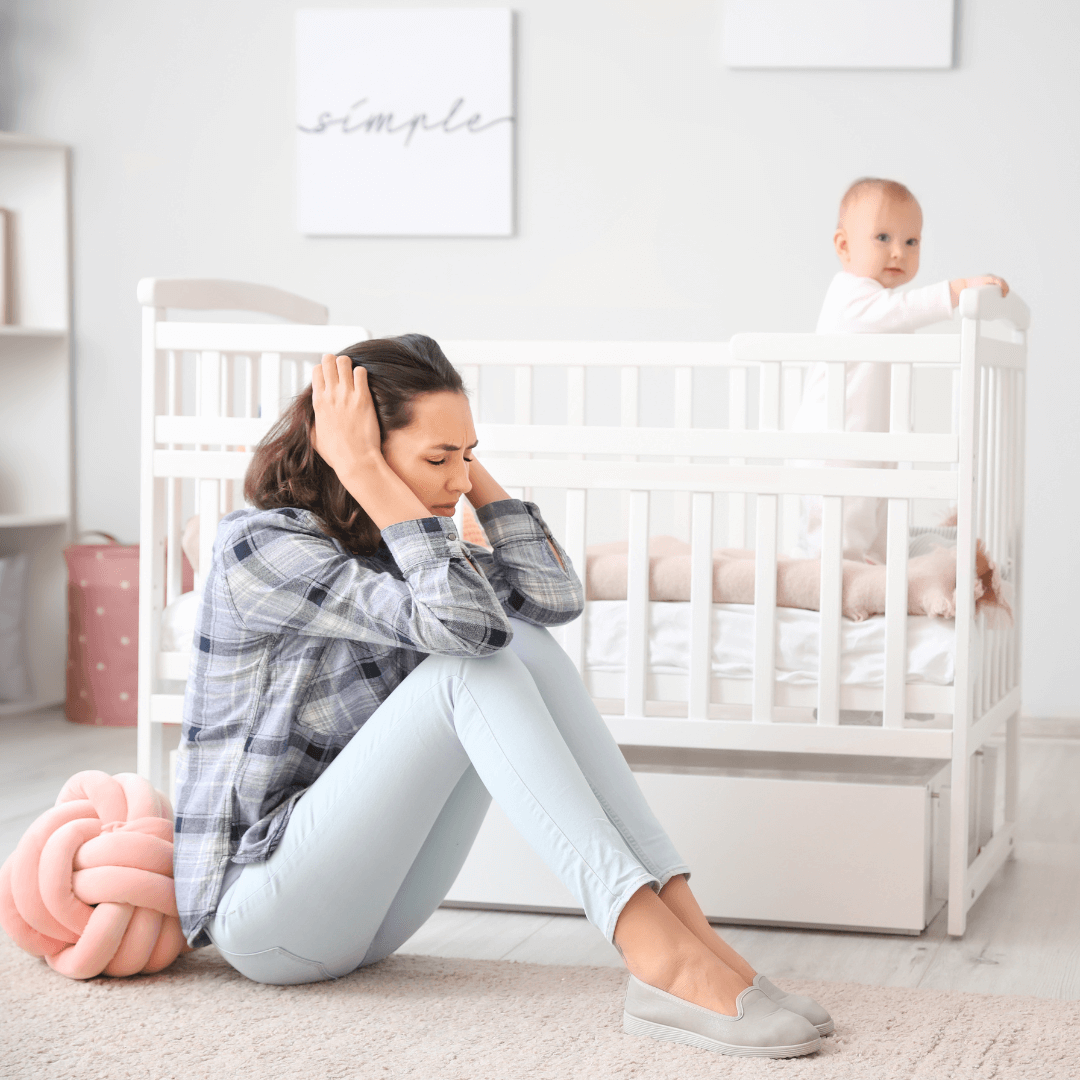Postnatal Depression – One Woman’s Story

For me, it started with nightmares.
A nightmare where my newborn was choking on a tea bag. She turned blue. I knelt next to her screaming out for help. Panicking. Crying.
A nightmare where my mum came over to help me, she held my newborn but tripped over getting up from the chair and fell. Crushing my baby’s head open on the skirting board.
A nightmare that I’d fallen asleep while feeding, suffocating her.
These nightmares were a few of the many I had in the first few months post my baby’s birth. They were so vivid, so realistic, and I was so sleep deprived that it would take a good 10 minutes and multiple checks on my baby to be able to convince myself it wasn’t real.
At 3 months, I remember staring at my baby playing on the floor and just feeling nothing, just numbness. I didn’t feel like playing with her, going out, seeing others, just not doing anything.
Before I had my baby, I’d been diagnosed with anxiety and depression. I was pretty functional with it – had a job, a partner etc but when I got pregnant I mentioned it to my obstetrician and he advised me to set up some sessions post birth as my past history set me up as high risk for getting post-natal depression. I was a little surprised really, despite this already being a red flag I was essentially told to sort it out myself.
For my husband – there were tears.
Lots of tears. He felt like life was ruined. That we had made a big mistake that we couldn’t turn away from. He was afraid to leave the hospital. He didn’t see our daughter as special, just some kind of small odd blob. He didn’t know who he was. What he was supposed to do. He cried more.
For my sister, it was a little different.
Her baby was born, 4.3kg, vaginally, with forceps giving her significant vaginal trauma and a broken coccyx. I watched a women who had dreamed of being a mum ignore her son. She didn’t want to hold him. Wouldn’t have a photo with him. It wasn’t dramatic – no screaming or yelling (at least not while I was around.) She was in so much pain herself, that the idea of caring for someone else didn’t compute. She resented him. She was denied the magical, instant ‘best moment of my life’ connection she was expecting. Breast feeding was hard. Everything was hard. Telling people that she didn’t want to look after her baby was not an option, the fear of judgement was very high.

Postnatal depression can vary immensely – from low self-esteem, tearfulness to panic attacks, suicidal thoughts and psychosis.
There are so many contributing factors that make the act of becoming a new parent the perfect breeding ground for experiencing mental health events:
- Sleep deprivation
- Social isolation
- Physical changes to the body
- Changes to your living situation
Talking to people, making time for yourself including appropriate exercise, accepting support and seeking professional help can all be of assistance. Sometimes you need all this and more to survive – and yes, it is literally about survival.
Your trainer, your family, your doctor, your maternal health nurse, your mothers group, your friends can all keep an eye on you. It’s also important to keep an eye on other mums you know and be ware of the signs.
I’m happy to say that me, my sister and my husband all survived – using a lot of the PANDA hotline (my husband’s preference), extra MCH visits (me), extra time thanks to a helpful mother-in-law (my sister) and therapy (also me) .
PND is very real, very present, very debilitating and another reason to keep supporting all women when they become mums far beyond just the birth and the early days.
Please don’t sit in silence, reach out for help and support like I did.
Support Services
- Maternal Child Health – these guys are checking not only on your baby, but on you. I received extra sessions when I was not feeling great and these check-ins were related solely to supporting me and my ability to cope.
- PANDA 1300 726 306, www.panda.org.au – an amazing national helpline offering free access to a therapist 9am-7:30pm Mon-Fri. It’s worth noting though that they do need to triage their calls so you might be waiting a little while to get on with a therapist.
- GP – your GP is a great place to start, to get referrals, assessments and care.
- Friends, Family, Trainers – having extra support with carers duties can create space for essential self-care. They’re not therapists so you may need to escalate to professionals if needed.
This article was written by a member of Fit For 2 (an SRE accredited group training program run by Anita Guerra in Melbourne’s Northern Suburbs).
Anita Guerra runs Fit For 2 in Victoria, . Learn more about Anita and Book your Trial today.
